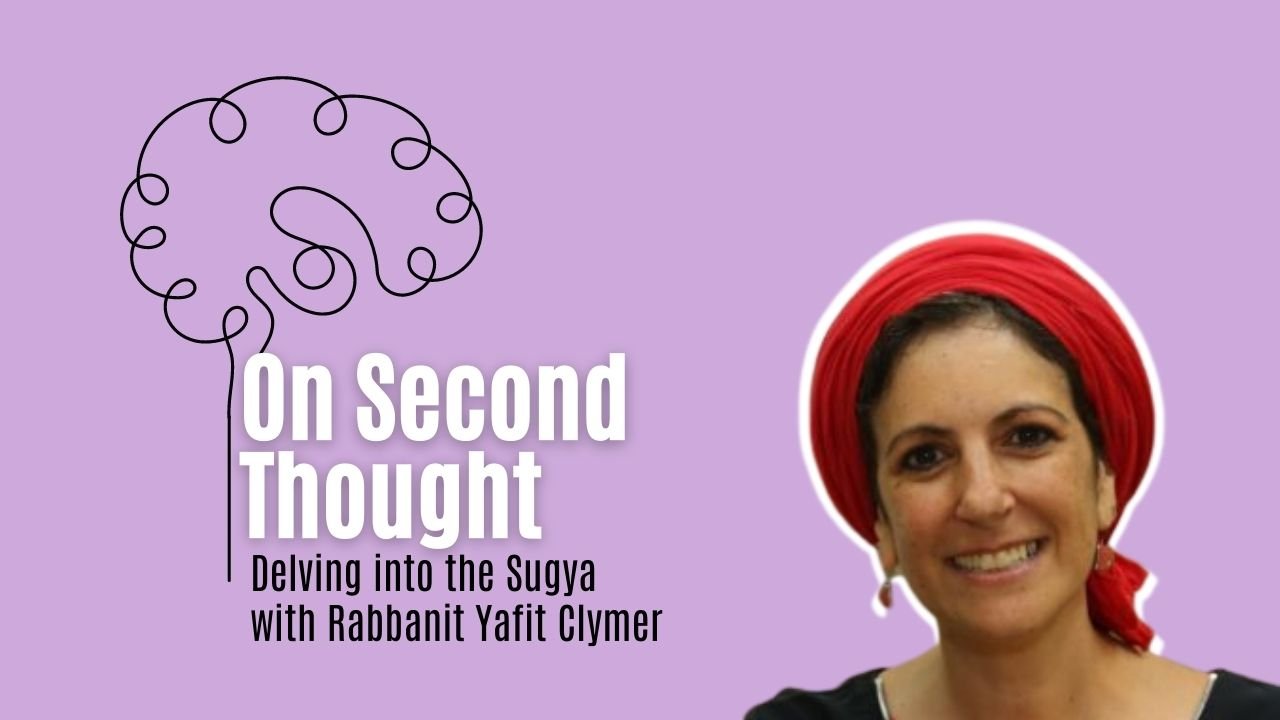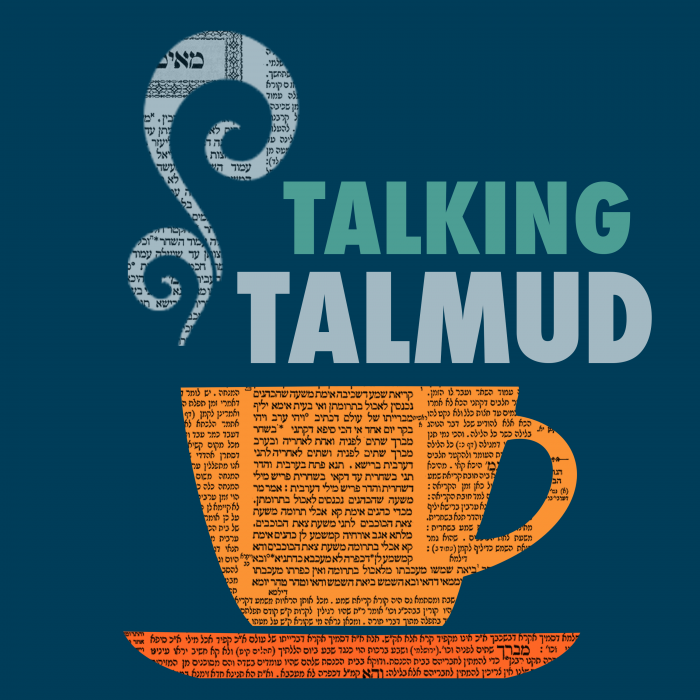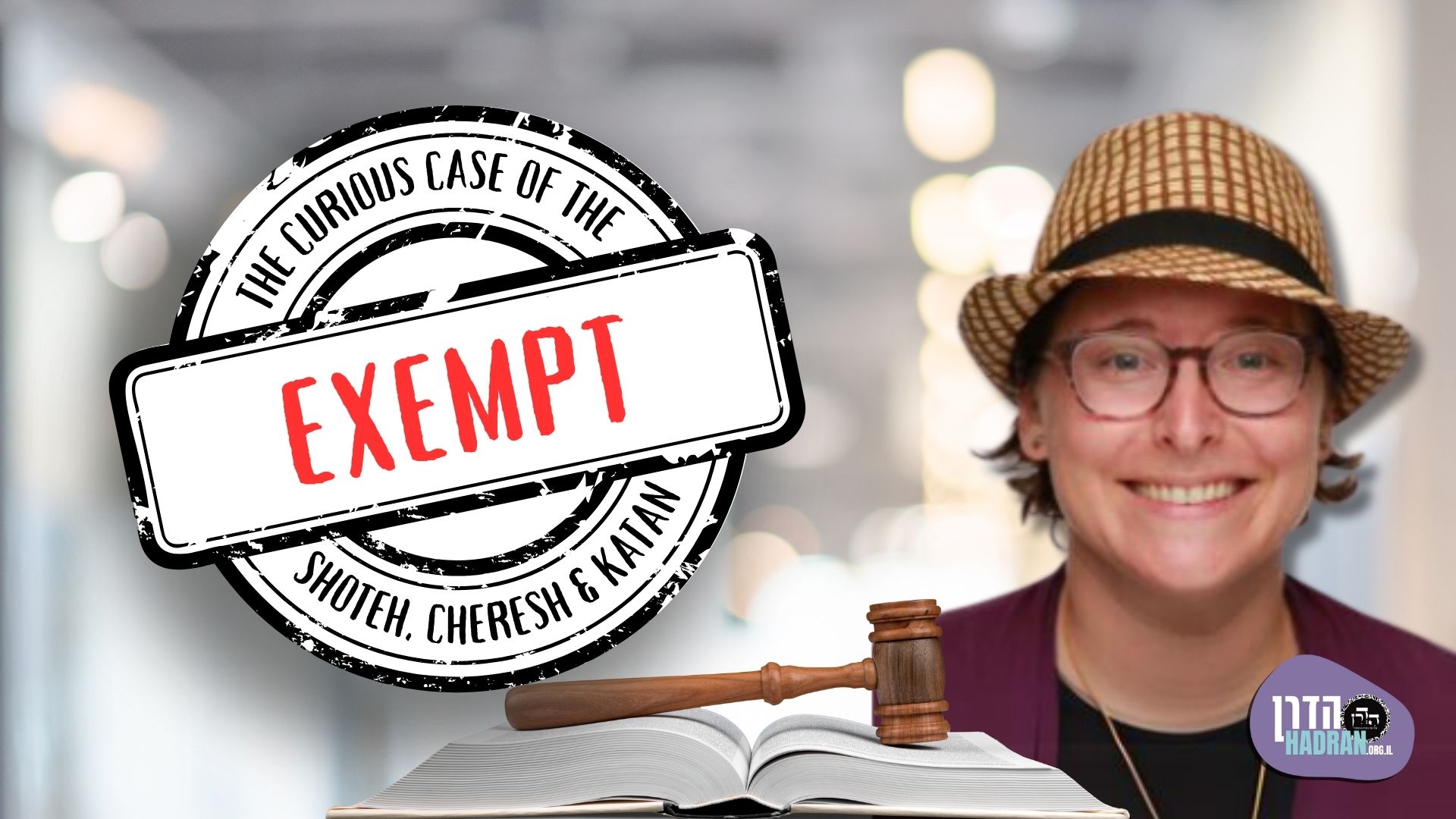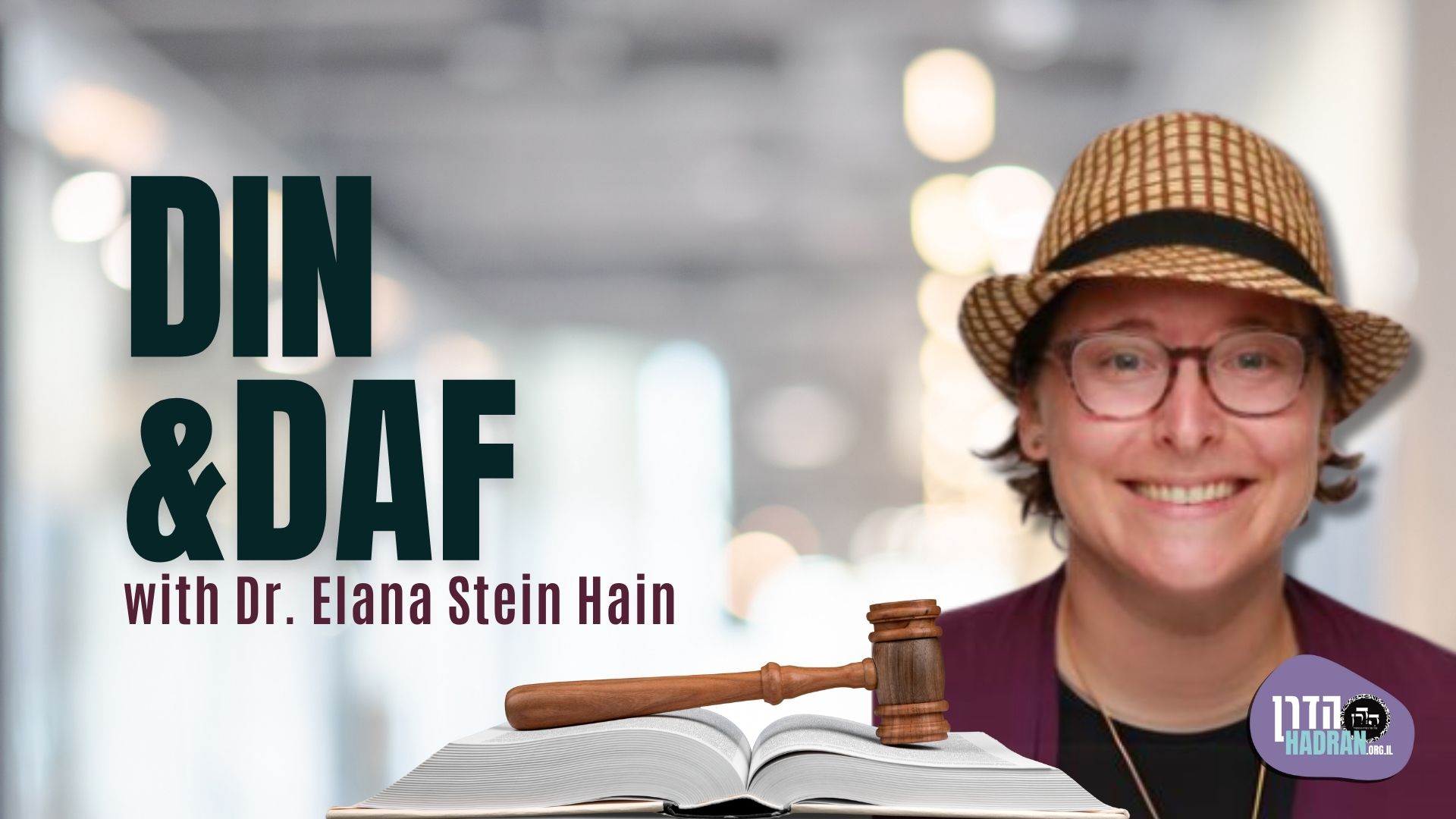Bava Kamma 111
דְּמֵינָח נִיחָא לַהּ בְּכֹל דְּהוּ – כְּרֵישׁ לָקִישׁ, דְּאָמַר רֵישׁ לָקִישׁ: טָב לְמֵיתַב טַן דּוּ, מִלְּמֵיתַב אַרְמְלוּ.
that it is satisfactory for her to have any kind of marital arrangement, and even had she taken into consideration the possibility of entering a levirate bond with this yavam who is afflicted with boils she still would have accepted betrothal to her husband. This is in accordance with the statement of Reish Lakish, as Reish Lakish says that women have a saying: It is better to sit as two bodies [tan du], i.e., to be married, than to sit lonely like a widow.
נָתַן אֶת הַכֶּסֶף לִיהוֹיָרִיב וְכוּ׳. תָּנוּ רַבָּנַן: נָתַן אָשָׁם לִיהוֹיָרִיב וְכֶסֶף לִידַעְיָה – יַחֲזִיר כֶּסֶף אֵצֶל אָשָׁם, דִּבְרֵי רַבִּי יְהוּדָה. וַחֲכָמִים אוֹמְרִים: יַחֲזִיר אָשָׁם אֵצֶל כֶּסֶף.
§ The mishna teaches: If the robber gave the money to the priestly watch of Joiarib and then gave the guilt-offering to the priestly watch of Jedaiah, the following priestly watch, to sacrifice on his behalf, he has fulfilled his obligation. By contrast, if he first gave the guilt-offering to the priestly watch of Joiarib and then gave the money to the priestly watch of Jedaiah, if the guilt-offering is extant, then members of the priestly watch of Jedaiah, who received the money, should sacrifice it. The Gemara quotes a baraita that records a dispute between tanna’im concerning this case. The Sages taught (Tosefta 10:18): If the robber gave the guilt-offering to the priestly watch of Joiarib and then gave the money to the priestly watch of Jedaiah, they should return the money to be with the guilt-offering, i.e., with the priestly watch of Joiarib; this is the statement of Rabbi Yehuda. And the Rabbis say the opposite: They should return the guilt-offering to be with the money, and the priestly watch of Jedaiah will sacrifice it.
הֵיכִי דָמֵי? אִילֵּימָא דְּיָהֵיב לֵיהּ אָשָׁם לִיהוֹיָרִיב בְּמִשְׁמַרְתּוֹ דִיהוֹיָרִיב, וְכֶסֶף לִידַעְיָה בְּמִשְׁמַרְתּוֹ דִידַעְיָה – זֶה זָכָה בְּשֶׁלּוֹ וְזֶה זָכָה בְּשֶׁלּוֹ!
The Gemara asks: What are the circumstances of this dispute? If we say that he gave the guilt-offering to the priestly watch of Joiarib during the priestly watch of Joiarib and the money to the priestly watch of Jedaiah during the priestly watch of Jedaiah, then this one acquired that which belongs to it and that one acquired that which belongs to it. Why would the court remove what was given lawfully to the priestly watch?
אָמַר רָבָא: הָכָא בְּמַאי עָסְקִינַן – דְּיָהֵיב אָשָׁם לִיהוֹיָרִיב בְּמִשְׁמַרְתּוֹ דִיהוֹיָרִיב, וְכֶסֶף לִידַעְיָה בְּמִשְׁמַרְתּוֹ דִיהוֹיָרִיב. רַבִּי יְהוּדָה סָבַר: כֵּיוָן דְּלָאו מִשְׁמַרְתּ[וֹ] דִּידַעְיָה הִיא – לִידַעְיָה קָנְסִינַן לֵיהּ, הִלְכָּךְ יַחֲזִיר כֶּסֶף אֵצֶל אָשָׁם; וְרַבָּנַן סָבְרִי: שֶׁלֹּא כַּדִּין (הוּא) עֲבוּד בְּנֵי יְהוֹיָרִיב דְּקַיבִּלוּ אָשָׁם מִקַּמֵּי כֶסֶף, הִלְכָּךְ לְדִידְהוּ קָנְסִינַן לְהוּ, וְיַחְזוֹר אָשָׁם אֵצֶל כֶּסֶף.
Rava said: With what are we dealing here? We are dealing with a case where he gave the guilt-offering to the priestly watch of Joiarib during the priestly watch of Joiarib and the money to the priestly watch of Jedaiah also during the priestly watch of Joiarib, and the dispute is as follows: Rabbi Yehuda holds that since this is not the priestly watch of Jedaiah, we penalize Jedaiah; therefore, the priestly watch of Jedaiah must return the money in their possession to be with the guilt-offering held by the Joiarib watch. And the Rabbis hold that the members of the priestly watch of Joiarib acted unlawfully when they accepted the guilt-offering before the robber paid the money, since payment for the robbery must be given before the guilt-offering can be offered. Therefore, we penalize them, and the guilt-offering in their possession returns to be with the money held by the Jedaiah watch.
תַּנְיָא, אָמַר רַבִּי: לְדִבְרֵי רַבִּי יְהוּדָה, אִם קָדְמוּ בְּנֵי יְהוֹיָרִיב וְהִקְרִיבוּ אֶת הָאָשָׁם – יַחְזוֹר וְיָבִיא אָשָׁם אַחֵר וְיַקְרִיבוּהוּ בְּנֵי יְדַעְיָה, וְזָכוּ הַלָּלוּ בְּמַה שֶּׁבְּיָדָן.
It is taught in a baraita on this topic (Tosefta 10:18): Rabbi Yehuda HaNasi says: According to the statement of Rabbi Yehuda, that if during the Joiarib watch the robber gave the guilt-offering to the Joiarib watch and the money to the Jedaiah watch, the money should return to the priestly watch of Joiarib, if the members of the priestly watch of Joiarib went first and sacrificed the guilt-offering before receiving the money from the priestly watch of Jedaiah, then the robber should go back and bring another guilt-offering, and the members of the priestly watch of Jedaiah, who are already in possession of the money, should offer it, and those members of the priestly watch of Joiarib acquired that offering that is in their possession.
אָמְרִי: לְמַאי חֲזֵי? אָשָׁם פָּסוּל הוּא! אָמַר רָבָא: לְעוֹרוֹ.
The Sages say: For what purpose is that offering useful? It is a disqualified guilt-offering, since it was sacrificed before the payment for the robbery was given, and had to be entirely burned on the altar. Rava said: The baraita is referring to acquiring its hide, which the members of the priestly watch of Joiarib keep.
תַּנְיָא, אָמַר רַבִּי: לְדִבְרֵי רַבִּי יְהוּדָה, אִם קַיָּים אָשָׁם – יַחֲזִיר אָשָׁם אֵצֶל כֶּסֶף.
It is taught in a baraita that Rabbi Yehuda HaNasi says: According to the statement of Rabbi Yehuda, if the guilt-offering is still extant, i.e., if the priestly watch of Joiarib did not already sacrifice it, then the priestly watch of Joiarib should return the guilt-offering to be with the money, and the priestly watch of Jedaiah will sacrifice it.
וְהָא רַבִּי יְהוּדָה – יַחֲזִיר כֶּסֶף אֵצֶל אָשָׁם אִית לֵיהּ! הָכָא בְּמַאי עָסְקִינַן – כְּגוֹן דִּנְפַק מִשְׁמַרְתּוֹ דִיהוֹיָרִיב, וְלָא תְּבַעוּ. וְהָא קָא מַשְׁמַע לַן – דְּאַחוֹלֵי אַחִילוּ גַּבַּיְיהוּ.
The Gemara questions this: But Rabbi Yehuda holds that they should return the money to be with the guilt-offering. The Gemara explains: With what are we dealing here? With a case where it happened that the priestly watch of Joiarib exited at the close of their Temple service and they did not demand the money from the priestly watch of Jedaiah. And this statement of Rabbi Yehuda HaNasi teaches us this: That by doing so, the members of the priestly watch of Joiarib waived their rights to the money in favor of the priestly watch of Jedaiah. Consequently, they are required to give the guilt-offering to the priestly watch of Jedaiah to sacrifice.
תַּנְיָא אִידַּךְ, אָמַר רַבִּי: לְדִבְרֵי רַבִּי יְהוּדָה, אִם קַיָּים אָשָׁם – יַחְזוֹר כֶּסֶף אֵצֶל אָשָׁם. פְּשִׁיטָא – הָכִי אִית לֵיהּ!
It is taught in another baraita that Rabbi Yehuda HaNasi says: According to the statement of Rabbi Yehuda, if the guilt-offering is still extant, i.e., if the priestly watch of Joiarib did not already sacrifice it, the money must return to be with the guilt-offering. The Gemara asks: Isn’t that obvious? This is what Rabbi Yehuda holds explicitly; what novelty did Rabbi Yehuda HaNasi teach?
הָכָא בְּמַאי עָסְקִינַן – כְּגוֹן דִּנְפַק מִשְׁמַרְתָּם דְּהָנֵי וּדְהָנֵי, וְלָא תְּבַעוּ. מַהוּ דְּתֵימָא אַחוֹלֵי גַּבֵּי הֲדָדֵי, קָא מַשְׁמַע לַן דְּאָמְרִינַן: כֵּיוָן דְּלָא תָּבְעִי, לִהְדְּרוּ בְּרֵישָׁא.
The Gemara explains: With what are we dealing here? With a case where it happened that the priestly watch of these and of those, i.e., both Joiarib and Jedaiah, exited at the end of their Temple service, and they did not demand of the other the item in possession of the other watch. Lest you say that they waived their rights in favor of each other, so that the money stays in possession of the Jedaiah watch, Rabbi Yehuda HaNasi teaches us that we say: Since the Jedaiah watch did not demand the guilt-offering from the Joiarib watch after the latter exited, let them go back to the first, standard scenario, returning the money to Joiarib to be with the guilt-offering.
שֶׁהַמֵּבִיא גְּזֵילוֹ עַד שֶׁלֹּא הֵבִיא אֲשָׁמוֹ [וְכוּ׳]. מְנָהָנֵי מִילֵּי? אָמַר רָבָא, דְּאָמַר קְרָא: ״הָאָשָׁם הַמּוּשָׁב לַה׳ לַכֹּהֵן, מִלְּבַד אֵיל הַכִּפֻּרִים אֲשֶׁר יְכַפֶּר בּוֹ״ – מִכְּלָל דְּכֶסֶף בְּרֵישָׁא.
§ The mishna teaches: For one who brings his stolen item to the priests before he brings his guilt-offering has fulfilled his obligation, but one who brings his guilt-offering before he brings his stolen item has not fulfilled his obligation. The Gemara asks: From where are these matters derived? Rava said: This is as the verse states: “But if the man has no kinsman to whom restitution may be made for the guilt, the restitution for guilt that is made shall be the Lord’s, even the priest’s; besides the ram of the atonement, whereby atonement shall be made for him” (Numbers 5:8). Learn by inference that the money must be returned first, before the guilt-offering is brought.
אָמַר הָהוּא מֵרַבָּנַן לְרָבָא: אֶלָּא מֵעַתָּה, ״מִלְּבַד עֹלַת הַבֹּקֶר״ – הָכִי נָמֵי מִכְּלָל דְּמוּסָפִין בְּרֵישָׁא?
Having understood that the inference is that the wording “besides the ram of the atonement” indicates that the ram must be brought after the money is given, one of the Sages said to Rava: If that is so, then in a different verse, which states concerning the additional offerings sacrificed on the first day of Passover: “You shall offer these besides the burnt-offering of the morning, which is for a continual burnt-offering” (Numbers 28:23), so too should one learn by inference that the additional offerings are brought first, before the morning burnt-offering?
וְהָתַנְיָא: מִנַּיִן שֶׁלֹּא יְהֵא דָּבָר קוֹדֵם לְתָמִיד שֶׁל שַׁחַר? תַּלְמוּד לוֹמַר: ״וְעָרַךְ עָלֶיהָ הָעֹלָה״, וְאָמַר רָבָא: ״הָעוֹלָה״ – עוֹלָה רִאשׁוֹנָה!
But isn’t it taught in a baraita: From where is it derived that no sacrifice shall precede the daily morning offering? The verse states: “And the fire on the altar shall be kept burning on it, it shall not be extinguished; and the priest shall kindle wood upon it every morning, and he shall prepare the burnt-offering upon it and shall cause the fats of the peace-offerings to go up in smoke upon it” (Leviticus 6:5). And Rava says: “The burnt-offering,” with the definite article, is referring to the first burnt-offering, i.e., the daily morning offering, which is first both chronologically and in terms of importance.
אֲמַר לֵיהּ: אֲנָא מֵ״אֲשֶׁר יְכַפֵּר בּוֹ״ נָפְקָא לֵיהּ, וַעֲדַיִין לֹא כִּיפֵּר.
Rava said to him: I do not hold that the tanna derives this halakha from the wording of: “Besides the ram of the atonement,” but I hold that the tanna derives it from the phrase in the same verse: “Whereby atonement shall be made for him” (Numbers 5:8), which is written in the future tense, indicating that he will achieve atonement in the future by bringing the ram of atonement, but as of now, when he is giving payment for the robbery, the offering did not yet atone for his sin.
נָתַן לוֹ אֶת הַקֶּרֶן וְכוּ׳. תָּנוּ רַבָּנַן: מִנַּיִן שֶׁאִם הֵבִיא מְעִילָתוֹ וְלֹא הֵבִיא אֲשָׁמוֹ; אֲשָׁמוֹ וְלֹא הֵבִיא מְעִילָתוֹ – שֶׁלֹּא יָצָא?
§ The mishna teaches: If he gave the principal to him but did not yet give the additional one-fifth payment, his not giving it does not preclude sacrificing the offering. The Gemara now clarifies the source of this halakha. The Sages taught in a baraita on the topic of the guilt-offering brought by one who misuses consecrated property, which is accompanied by repayment of the value of the item and an additional fifth of its value: From where is it derived that if he brought his payment for his benefit from misuse of consecrated property but did not bring his guilt-offering, or if he brought his guilt-offering but did not bring his payment for his benefit from misuse of consecrated property, that he did not fulfill his obligation?
תַּלְמוּד לוֹמַר: ״בְּאֵיל הָאָשָׁם וְנִסְלַח לוֹ״.
The baraita continues: The verse states: “With the ram of the guilt-offering [ha’asham], and he shall be forgiven” (Leviticus 5:16). The baraita interprets the phrase: “The ram of the guilt-offering,” to be referring to two entities: The ram, i.e., the offering, and the payment, represented by the words “the guilt-offering”; this teaches that forgiveness and atonement are achieved only after both the ram of the guilt-offering is sacrificed and the restitution of the monetary payment is given.
וּמִנַּיִן שֶׁאִם הֵבִיא אֲשָׁמוֹ עַד שֶׁלֹּא הֵבִיא מְעִילָתוֹ, שֶׁלֹּא יָצָא? תַּלְמוּד לוֹמַר: ״בְּאֵיל הָאָשָׁם״ – הָאָשָׁם בִּכְבָר.
The baraita continues: And from where is it derived that if he brought his guilt-offering before bringing his payment for his benefit from misuse of consecrated property that he did not fulfill his obligation? The verse states: “With the ram of the guilt-offering,” indicating that the guilt-offering was already brought.
יָכוֹל כְּשֵׁם שֶׁאַיִל וְאָשָׁם מְעַכְּבִים, כָּךְ חוֹמֶשׁ מְעַכֵּב? תַּלְמוּד לוֹמַר: ״בְּאֵיל הָאָשָׁם וְנִסְלַח לוֹ״ – אַיִל וְאָשָׁם מְעַכְּבִים בְּהֶקְדֵּשׁ, וְאֵין חוֹמֶשׁ מְעַכֵּב.
The baraita continues: One might have thought that just as the ram and guilt-offering, i.e., payment, preclude his achieving atonement, so too, payment of the additional one-fifth of the value precludes his achieving it. Therefore, the verse states: “With the ram of the guilt-offering, and he shall be forgiven,” which teaches that the ram and guilt-offering, i.e., payment, preclude his achieving atonement with regard to consecrated property, but the payment of the additional one-fifth does not preclude his achieving it.
וְיִלְמַד הֶקְדֵּשׁ מֵהֶדְיוֹט, וְהֶדְיוֹט מֵהֶקְדֵּשׁ.
The Gemara clarifies: And let the halakha of misuse of consecrated property be learned from the halakha of common money, i.e., payment for robbery of a convert who died without heirs, and let the halakha of common money be learned from the halakha of misuse of consecrated property.
הֶקְדֵּשׁ מֵהֶדְיוֹט – מָה ״אָשָׁם״ דְּהָתָם קֶרֶן, אַף ״אָשָׁם״ דְּהָכָא קֶרֶן. וְהֶדְיוֹט מֵהֶקְדֵּשׁ – מָה הֶקְדֵּשׁ אֵין חוֹמֶשׁ מְעַכֵּב, אַף הֶדְיוֹט נָמֵי אֵין חוֹמֶשׁ מְעַכֵּב.
In what manner? The halakha of misuse of consecrated property can be learned from the halakha of common money as follows: Just as the word “guilt” that is written there, in the context of robbery of a convert, is referring to the principal, i.e., the payment itself, so too, the word “guilt” that is written here, in the context of misuse of consecrated property, is referring to the principal. And the halakha of common money can be learned from the halakha of misuse of consecrated property as follows: Just as with regard to the halakha of misuse of consecrated property the additional one-fifth payment does not preclude his achieving atonement, so too, with regard to the halakha of common money as well, the additional one-fifth payment does not preclude his achieving atonement.
הֲדַרַן עֲלָךְ הַגּוֹזֵל עֵצִים.
MISHNA: In the case of one who robs another of food and feeds it to his children, or who left a stolen item to them and then died, the children are exempt from paying the victim of the robbery after their father’s death. But if the stolen item was something that serves as a legal guarantee of a loan, the heirs are obligated to pay.
מַתְנִי׳ הַגּוֹזֵל וּמַאֲכִיל אֶת בָּנָיו, וְהִנִּיחַ לִפְנֵיהֶם – פְּטוּרִין מִלְּשַׁלֵּם. וְאִם הָיָה דָּבָר שֶׁיֵּשׁ בּוֹ אַחְרָיוּת – חַיָּיבִין לְשַׁלֵּם.
GEMARA: Rav Ḥisda says: If one robbed another, and the owners of the stolen item have not yet despaired of retrieving it, and another person came, took it from the robber and ate it, if the owner wishes he may collect from this one, i.e., the first robber, and if he wishes he may collect from that one, i.e., the second robber. What is the reason that he may collect from whomever he chooses? It is because as long as the owners did not despair of retrieving it, it remains the possession of its owner, so that when the second robber stole it from the first, he was in fact stealing from the original owner. Nevertheless, since the first robber was already obligated to return the item, his obligation remains in force and the owner may demand payment from him if he wishes.
גְּמָ׳ אָמַר רַב חִסְדָּא: גָּזַל וְלֹא נִתְיָיאֲשׁוּ הַבְּעָלִים, וּבָא אַחֵר וַאֲכָלוֹ מִמֶּנּוּ – רָצָה מִזֶּה גּוֹבֶה, רָצָה מִזֶּה גּוֹבֶה. מַאי טַעְמָא? כֹּל כַּמָּה דְּלֹא נִתְיָיאֲשׁוּ הַבְּעָלִים – בִּרְשׁוּתֵיהּ דְּמָרֵיהּ קָאֵי.
The Gemara questions this opinion based on what we learned in the mishna: In the case of one who robs another of food and feeds it to his children, or one who left a stolen item to them as an inheritance, the children are exempt from paying the victim of the robbery after their father’s death. This appears to be a conclusive refutation of the opinion of Rav Ḥisda, who holds that one who steals from a thief is obligated to pay the owner. The Gemara answers: Rav Ḥisda could have said to you: When that mishna is taught, it is addressing a case where it is after the owners had already despaired of retrieving the item, whereas Rav Ḥisda was referring to a case where the owners had not yet despaired.
תְּנַן: הַגּוֹזֵל וּמַאֲכִיל אֶת בָּנָיו, וְהִנִּיחַ לִפְנֵיהֶם – פְּטוּרִין מִלְּשַׁלֵּם. תְּיוּבְתָּא דְּרַב חִסְדָּא! אָמַר לְךָ רַב חִסְדָּא: כִּי תַּנְיָא הָהִיא – לְאַחַר יֵאוּשׁ.
§ The mishna stated that if one left a stolen item to his children as an inheritance, the children are exempt from paying the owner. Rami bar Ḥama said: That is to say that the domain of an heir is comparable to the domain of a purchaser. Just as an item that is purchased leaves the domain of the seller, an item that is inherited leaves the domain of the deceased and is considered the property of the heir. Since the owner has despaired of retrieving the item and the item has changed domains, it is entirely the property of the new owner, and he is exempt from payment.
אִם הִנִּיחַ לִפְנֵיהֶם – פְּטוּרִין מִלְּשַׁלֵּם. אָמַר רָמֵי בַּר חָמָא, זֹאת אוֹמֶרֶת: רְשׁוּת יוֹרֵשׁ כִּרְשׁוּת לוֹקֵחַ דָּמֵי.
Rava disagreed and said that the domain of an heir is not comparable to the domain of a purchaser. Consequently, the item has not undergone a complete change of ownership and the heir would be required to return it. And as for the explanation of the mishna, here we are dealing with a case where they had already consumed the stolen goods, so there is nothing to return to the owner.
רָבָא אָמַר: רְשׁוּת יוֹרֵשׁ לָאו כִּרְשׁוּת לוֹקֵחַ דָּמֵי, וְהָכָא בְּמַאי עָסְקִינַן – כְּשֶׁאֲכָלוּם.
The Gemara questions the opinion of Rava: From the fact that the latter clause teaches: If it was something that serves as a legal guarantee, and is, therefore, an existing commodity, the heirs are obligated to pay, it may be inferred that in the first clause we are also dealing with a stolen item that is extant. This is contrary to Rava’s statement that the mishna is discussing stolen goods that have been consumed. The Gemara answers: Rava could have said to you that this is what the mishna is saying: If their father left them guaranteed property, i.e., land, they are obligated to pay from that property, even if the stolen item is not extant.
הָא מִדְּקָתָנֵי סֵיפָא: אִם הָיָה דָּבָר שֶׁיֵּשׁ בּוֹ אַחְרָיוּת – חַיָּיבִין לְשַׁלֵּם, מִכְּלָל דְּרֵישָׁא בִּגְזֵילָה קַיֶּימֶת עָסְקִינַן! אָמַר לָךְ רָבָא, הָכִי קָאָמַר: אִם הִנִּיחַ לָהֶם אֲבִיהֶם אַחְרָיוּת נְכָסִים, חַיָּיבִין לְשַׁלֵּם.
The Gemara asks: But didn’t Rabbi Yehuda HaNasi teach Rabbi Shimon, his son, that this mishna is not referring only to something that may actually serve as a legal guarantee, i.e., land? Rather, it is referring even to a cow that he plows with, or a donkey that he drives by directing it from behind, which the heirs are obligated to return because of the honor of their father. This indicates that the mishna is referring to stolen property that is extant, and not to land.
וְהָא מַתְנֵי לֵיהּ רַבִּי לְרַבִּי שִׁמְעוֹן בְּרֵיהּ: לֹא דָּבָר שֶׁיֵּשׁ בּוֹ אַחְרָיוּת מַמָּשׁ; אֶלָּא אֲפִילּוּ פָּרָה וְחוֹרֵשׁ בָּהּ, חֲמוֹר וּמְחַמֵּר אַחֲרָיו – חַיָּיבִין לְהַחְזִיר, מִפְּנֵי כְּבוֹד אֲבִיהֶן.
Rather, Rava said: When I die, Rabbi Oshaya will come toward me from his place in heaven in order to greet me, as I explain the mishna in accordance with his opinion and thereby honor him. As Rabbi Oshaya taught in a baraita: In a case of one who robs another and feeds the stolen goods to his children, the latter are exempt from paying the owner. If he left a stolen item to them as an inheritance, if the stolen item is extant, the heirs are obligated to return it to the owner; if it is not extant, they are exempt. If their father left them guaranteed property, i.e., land, they are obligated to pay the owner. Rava explains the mishna as being consistent with the baraita of Rabbi Oshaya, although this explanation is not consistent with Rabbi Yehuda HaNasi’s interpretation.
אֶלָּא אָמַר רָבָא: כִּי שָׁכֵיבְנָא – רַבִּי אוֹשַׁעְיָא נָפֵיק לְווֹתִי, דְּתָרֵיצְנָא מַתְנִיתִין כְּווֹתֵיהּ. דְּתָנֵי רַבִּי אוֹשַׁעְיָא: הַגּוֹזֵל וּמַאֲכִיל אֶת בָּנָיו – פְּטוּרִין מִלְּשַׁלֵּם. הִנִּיחַ לִפְנֵיהֶם – גְּזֵילָה קַיֶּימֶת, חַיָּיבִין; אֵין הַגְּזֵילָה קַיֶּימֶת, פְּטוּרִין. הִנִּיחַ לָהֶם אֲבִיהֶם אַחְרָיוּת נְכָסִים – חַיָּיבִין לְשַׁלֵּם.
The Gemara analyzes the baraita of Rabbi Oshaya. The Master said in the baraita that if the stolen item is not extant, the heirs are exempt from payment. Let us say that this baraita is a conclusive refutation of the opinion of Rav Ḥisda, who says that heirs are obligated to pay for stolen goods that they consumed. The Gemara answers: Rav Ḥisda could have said to you that when that baraita is taught, it is referring to a case where it is after the owners had already despaired of retrieving the item, whereas Rav Ḥisda was referring to a case in which the owners had not yet despaired.
אָמַר מָר: אֵין הַגְּזֵילָה קַיֶּימֶת – פְּטוּרִין. נֵימָא תֶּיהְוֵי תְּיוּבְתָּא דְּרַב חִסְדָּא? אָמַר לָךְ רַב חִסְדָּא: כִּי תַּנְיָא הָהִיא – לְאַחַר יֵאוּשׁ.
The Gemara continues: The Master said in the baraita that if the stolen item is extant, the heirs are obligated to pay. Let us say that this baraita is a conclusive refutation of the opinion of Rami bar Ḥama, since according to his understanding, the heirs should be exempt from payment because the stolen item is considered to have changed ownership when they inherited it. The Gemara answers: Rami bar Ḥama could have said to you that when that baraita is taught,
אָמַר מָר: גְּזֵילָה קַיֶּימֶת – חַיָּיבִין לְשַׁלֵּם. נֵימָא תֶּיהְוֵי תְּיוּבְתָּא דְּרָמֵי בַּר חָמָא? אָמַר לָךְ רָמֵי בַּר חָמָא: כִּי תַּנְיָא הָהִיא –

























